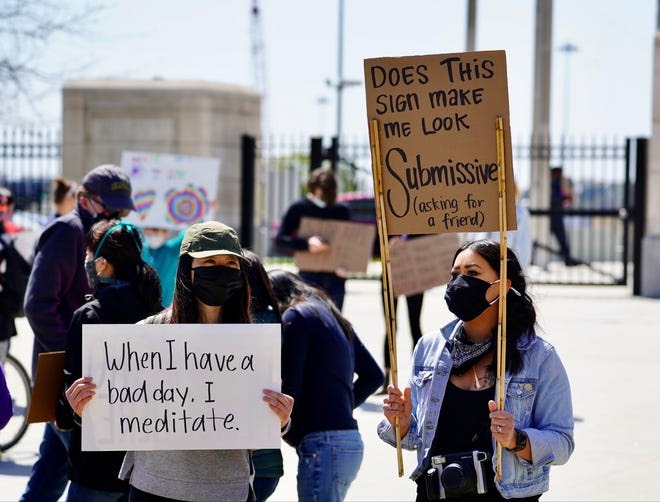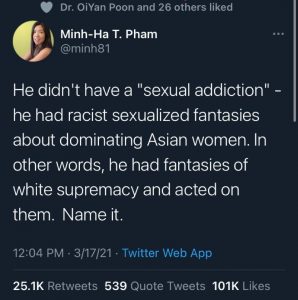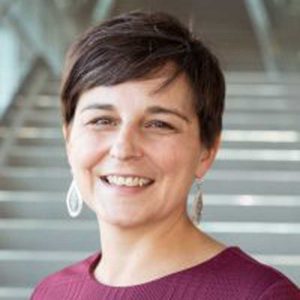
Photo from USA Today
As we keep listening to the news about the mass murder of primarily Asian women in Atlanta, we grow more and more disheartened by our society’s collective understanding of misogyny, white supremacy, and hate. Even more specifically, we are so over the ways we talk about white men’s violence – “he had a bad day,” “he had a sex addiction.” In other instances, it’s “he had a mental health issue.” Yes, and many of us wrestle with mental health and addiction and ALL of us have “bad days” and we don’t go around killing people. And further, we don’t target a very specific segment of the population that may threaten our access to power.
The number of issues of oppression in this situation is vast and wide. We cannot cover every aspect of the complexities of it in one post, but we encourage you to keep reading about it and expanding your perspective. We found this piece by Jennifer Ho to be especially powerful in describing the fear of living as an Asian woman in America. And a discussion of the misinformed ways we understand and talk about racialized sex work in the U.S. can be found here. And finally, there are many reasons to avoid seeking a hate crime designation, which you can learn more about here.
Although this is likely obvious at this point, we think it bears restating and reminding:
People with the most power and who are least likely to lose said power act on their “fear” the most.
Cases in point: white men afraid of losing “their” country stormed the capitol wreaking havoc on the lives of many people on January 6; ALL of the mass murders in the past 50 years: Columbine, the Charleston Church Massacre, the San Bernardino murders, the Isla Vista Murders, etc etc
At the same time, masses of people with limited access to power show up over and over and over again with love, anger, and resilience. Without killing anyone.
And guess who keeps showing up for work every day, despite the very real consequences that they could be shot in broad daylight for doing their jobs? Or are more likely to contract COVID at their jobs? The Asian women working in these spas, people of color who disproportionately hold jobs like grocery store employees, custodial staff, and caretakers for those who are ill and/or elderly.
This white man in Georgia killed EIGHT people, at least six of whom were Asian American women. And guess what, to find out if this was a “hate crime,” the cops asked HIM if it was racially motivated. Asked. Seriously. Of course, he said no. That’s not how white supremacy works – a lot of us who have internalized white supremacist beliefs wouldn’t SAY that something was racially motivated – because, in our minds, it’s not. We haven’t taken the time to dig in and ask where our beliefs came from. We saw this Tweet yesterday that summarized it well:

This is the reality in which we live, people. And these are the ways that white supremacy and misogyny are wound up together. THIS is why when we do the work of addressing relationship and sexual violence among college students, we MUST do it at the intersections. People who are addicted to power are addicted to power, plain and simple – and they act on it regularly. In all of the ways. People who are racist are also sexist are also homophobic are also transphobic are also…
And, the reality is when we have internalized these hateful beliefs, we act on them, knowingly or not. No, the-run-of-the-mill college man who causes harm to the people around him by ignoring their boundaries to get what he wants is not as extreme as this particular white man from Georgia. And yet, it all stems from the same place: the way we’ve taught people with power to use said power to get what they want and to do so without consequences. When we keep making excuses for the people in our lives to explain away their harmful and deadly behavior, we keep allowing it to happen. Talking about someone’s mental health or addiction AFTER they commit a heinous crime is unhelpful – what would be helpful is to address the complexities of these issues all along. And, to acknowledge that behavior rooted in misogyny and white supremacy may be related to mental health, but it’s more likely just plain hate, fear, and superiority.
As many of you know, one of our hopes at the MCVP is to intervene with perpetrators and potential perpetrators before violence occurs. When we hear of things like this, it makes it almost impossible to consider how we could ever work with the people causing the harm. And the reality is, this is not the work that any of us want to do. It’s painful, it’s ugly, it’s all uphill. And it is necessary. And we must start way earlier than when people get to this point. And we must address this as an issue of power as much as anything else. What is it that makes white men feel so threatened? How can we engage them in ways that illustrate how sharing power, rather than hoarding it, makes life so much better? How can we engage them in a way that helps them see they are hurting themselves in the process of hurting everyone around them?
We don’t say this to be apologetic for white men’s (and all white people for that matter) violence – we say it to help us dig at the roots. We don’t think we can fight hate with hate. We do, however, think we can harness our rage AND our compassion and dig in and start addressing white supremacy and misogyny before it gets to this place. But it will take all of us, and it will require us to do some good hard looking at ourselves and the people we love to make it happen.
The MCVP has a position at the University of Utah where we have the opportunity to intervene with college-aged students to shift their thinking. By intervening at this time of a person’s life we can help create an environment of introspection to break the cycle of power-hungry boys, shaped by an oppressive society, that grow up to be hateful creatures. Prevention work turns into intervening with the system of oppression before harm is caused. We must call-in white men to sit down and have an intervention with themselves. To evaluate their actions and thinking and how they are causing harm to those around them. The privilege and power a person holds to be able to ignore the hate occurring in America is not something to be taken lightly. We live in a society and a country that normalizes and discounts misogyny, white supremacy, and an addiction to power: hate.
 Chris Linder is an Associate Professor of Educational Leadership and Policy and Director of the McCluskey Center for Violence Prevention at the University of Utah.
Chris Linder is an Associate Professor of Educational Leadership and Policy and Director of the McCluskey Center for Violence Prevention at the University of Utah.
 Allie Moore is a Student Staff member at the McCluskey Center for Violence Prevention in her Junior year at the University of Utah.
Allie Moore is a Student Staff member at the McCluskey Center for Violence Prevention in her Junior year at the University of Utah.
